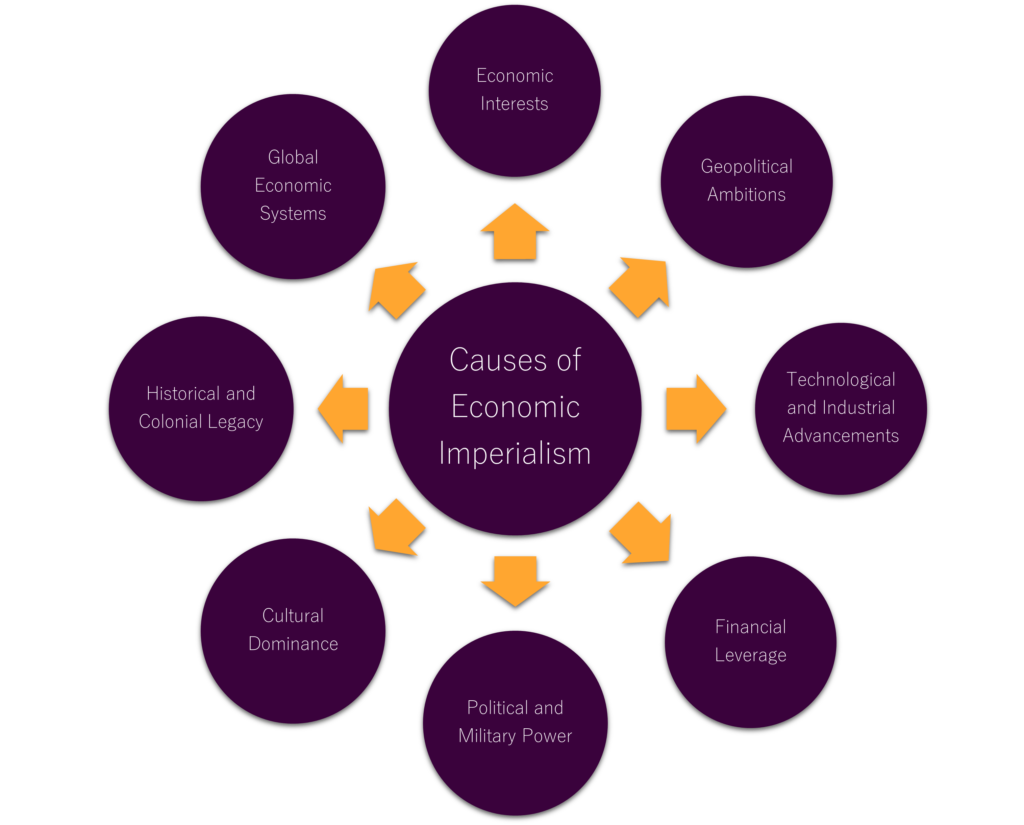“Economic imperialism” means the domination and influence exerted by a nation, a group of nations, or large corporations over others. Hence, it involves the extension of economic power and control beyond national borders. It often results in the further exploitation of resources, markets, labour, and financial systems of less powerful or developing nations.
Economic imperialism can manifest through various means, such as unequal trade relationships, financial leverage, resource extraction, and the establishment of economic dependencies. Therefore, the concept is often associated with the idea of a powerful entity using economic influence to shape and direct the policies, institutions, and economic activities of other nations to its advantage.
Historically, economic imperialism has been associated with the colonial era, where European powers exerted economic control over their colonies. In the contemporary context, it can also be observed through the influence of powerful nations or multinational corporations. As a result, it is often argued that economic imperialism can lead to exploitation, inequality, and the perpetuation of economic disparities between nations.
Econometrics Tutorials with Certificates
Causes of Economic Imperialism

Economic Interests
- Resource Acquisition: Powerful nations may seek to acquire and further exploit the natural resources of other regions to meet their own economic needs. This also includes access to minerals, energy sources, and agricultural products.
- Market Expansion: Economic imperialism is often driven by the desire to expand markets for goods and services. Hence, dominant economic powers may look to establish or control markets in other nations to ensure the growth of their industries.
Geopolitical Ambitions
- Strategic Influence: Economic dominance is often linked to geopolitical aspirations. Powerful nations may also seek to exert influence over strategically important regions. They do this to further enhance their geopolitical standing and security.
- Control of Trade Routes: Dominant powers may aim to control key trade routes and access to important ports, therefore, facilitating the movement of goods and ensuring economic dominance.
Technological and Industrial Advancements
- Technological Superiority: Advanced industrial and technological capabilities can also give certain nations a competitive edge. As a result, Economic imperialism may be driven by the desire to export technology and industrial products to less developed nations.
- Infrastructure Development: Dominant powers may invest in the development of infrastructure in other nations, thus, creating dependencies that serve their economic interests.
Financial Leverage
- Debt and Dependency: Loans and financial assistance provided by powerful nations can also create economic dependencies. Debtor nations may find themselves beholden to the creditor, allowing the dominant power to further influence economic policies and decisions.
- Control of Financial Institutions: Dominant powers may also exert control over international financial institutions, shaping global economic policies and conditions for borrowing nations.
Political and Military Power
- Military Strength: The military power of a nation can also be used to enforce economic dominance. Historical examples include colonial powers using military force to secure economic interests in overseas territories.
- Political Influence: Economic imperialism is often accompanied by political influence. Hence, dominant economic powers may use their economic leverage to shape the political landscape of other nations, gaining support for their economic objectives.
Cultural Dominance
- Cultural Influence: Economic imperialism may also involve the export of cultural products, including media, entertainment, and consumer goods. This cultural influence can shape the values and preferences of other societies, further contributing to economic dependencies.
Historical and Colonial Legacy
- Colonial History: The legacy of colonialism has had a lasting impact on economic relationships. Historical ties and structures established during the colonial era continue to shape economic interactions between former colonies and colonial powers.
Global Economic Systems
- International Trade Agreements: The design and enforcement of international trade agreements can also contribute to economic imperialism by favouring the interests of powerful nations.
- Global Economic Institutions: The influence of dominant powers in global economic institutions, such as the International Monetary Fund (IMF) and World Bank, can shape economic policies on a global scale.
Understanding economic imperialism requires considering the interplay of these factors, and the motivations can vary depending on the historical context and the specific nations involved.
Consequences of Economic Imperialism
Resource Exploitation and Environmental Impact
- Depletion of Resources: Economic imperialism often involves the extraction and exploitation of natural resources from subordinate nations. As a result, this leads to environmental degradation and depletion of local resources.
- Ecological Consequences: Moreover, the pursuit of economic interests without sufficient regard for environmental sustainability can result in long-term ecological damage and loss of biodiversity.
Economic Inequality
- Wealth Disparities: Economic imperialism can also exacerbate global economic inequalities. This happens as powerful nations or corporations amass wealth at the expense of less developed nations.
- Unequal Access to Benefits: Subordinate nations may also have limited access to the benefits derived from the exploitation of their own resources, leading to uneven economic development.
Dependency and Debt
- Economic Dependency: Subordinate nations may become economically dependent on the dominant power. This can happen due to loans, investments, and trade relationships, creating a cycle of dependency.
- Debt Burden: Furthermore, loans provided by dominant powers can lead to significant debt burdens for subordinate nations, affecting their economic sovereignty and capacity for independent decision-making.
Cultural Homogenization
- Cultural Erosion: Economic imperialism often involves the export of cultural products and values from the dominant power, also contributing to the erosion of local cultures and traditions.
- Homogenization: The dominance of global brands and cultural products can lead to cultural homogenization, diminishing diversity and contributing to a globalized culture.
Social Disruption
- Labour Exploitation: Economic imperialism may also result in the exploitation of cheap labour in subordinate nations, leading to poor working conditions and social unrest.
- Social Inequality: The concentration of economic power in the hands of a few can further contribute to social inequality within subordinate nations, potentially leading to social unrest and conflicts.
Political Influence and Instability
- Political Instability: Economic imperialism can also contribute to political instability in subordinate nations, as dominant powers may influence or manipulate local politics to serve their economic interests.
- Loss of Sovereignty: Moreover, subordinate nations may experience a loss of political sovereignty as economic decisions and policies are influenced by external forces.
Trade Imbalances
- Trade Deficits: Economic imperialism can result in trade imbalances, with subordinate nations exporting raw materials and importing finished goods. This dynamic can contribute to persistent trade deficits, hence, hindering local industrial development.
Global Insecurity
- Conflict Potential: The pursuit of economic interests through imperialism can lead to geopolitical tensions and conflicts, especially when dominant powers compete for control over strategic resources or territories.
- Migration Pressures: Economic disparities resulting from imperialism can also contribute to migration pressures, as people seek better economic opportunities in more affluent nations.
Resistance and Nationalism
- Anti-Imperialist Movements: Subordinate nations may develop resistance movements or nationalistic sentiments in response to economic imperialism, seeking to reclaim control over their resources and destinies.
- Political Backlash: Additionally, Economic imperialism can lead to political backlash, potentially affecting diplomatic relations and international cooperation.
The consequences of economic imperialism are complex and interconnected, and they vary depending on historical, cultural, and geopolitical contexts. While economic imperialism may contribute to economic development in some cases, it often results in exploitation, inequality, and long-term harm to the societies involved.
Strategies to counter Economic Imperialism
Diversification of Economies
- Encourage the development of diverse and resilient economies that are not overly reliant on a narrow range of industries or exports. As a result, this can reduce vulnerability to economic manipulation and exploitation.
Investment in Education and Technology
- Prioritize investments in education and technology to build a skilled workforce and also foster innovation. A knowledgeable and skilled population is better equipped to participate in global economic activities on more equitable terms.
Promotion of Local Industries
- Support the growth of local industries to reduce dependence on foreign goods and services. This may involve implementing policies that protect domestic industries, thus, encouraging entrepreneurship, and promoting fair competition.
Economic Cooperation
- Foster regional economic cooperation and integration to enhance the collective bargaining power of nations. Collaborative efforts can lead to shared economic benefits and, therefore, a more balanced global economic landscape.
Fair Trade Practices
- Advocate for fair trade practices that ensure equitable terms for both exporting and importing nations. Encouraging transparent and ethical business practices can contribute to more balanced economic relationships.
Debt Management and Transparency
- Manage debt responsibly and transparently to avoid falling into unsustainable debt burdens. Negotiate fair terms for loans and also promote responsible lending and borrowing practices.
Political Autonomy
- Preserve policy autonomy to make decisions that align with national interests. Hence, avoid excessive dependence on external economic advisors or institutions that may prioritize their own interests over those of the nation.
Strengthening Political Institutions
- Build strong political institutions that are resistant to external manipulation. Transparent and accountable governance structures can help safeguard national interests and prevent undue external influence.
Social and Cultural Preservation
- Promote the preservation of local cultures and values. Strong cultural identities can act as a bulwark against cultural homogenization associated with economic imperialism.
Development of Regional Financial Institutions
- Strengthen regional financial institutions that can provide alternatives to global financial organizations. This can reduce dependency on external financial structures that may be influenced by economic imperialism.
International Cooperation
- Engage in international cooperation and alliances to address issues related to economic imperialism collectively. Collaborative efforts can amplify the impact of individual nations in shaping global economic policies.
Public Awareness and Advocacy
Raise public awareness about the consequences of economic imperialism and advocate for policies that prioritize sustainable development, social justice, and economic equality.
Countering economic imperialism is a complex and long-term endeavour that requires coordinated efforts at national and international levels. The key is to empower nations to assert their economic sovereignty, promote equitable economic relationships, and ensure that economic development benefits all segments of society.
Conclusion
In conclusion, economic imperialism is a complex and historically rooted phenomenon that continues to shape global economic relations. It involves the exertion of influence and control by powerful nations or entities over the economies of less powerful nations, often leading to exploitation, inequality, and various socio-economic consequences.
Countering economic imperialism requires a multifaceted and proactive approach, encompassing economic diversification, investment in education and technology, fair trade practices, and the preservation of cultural identities. Additionally, strengthening political institutions, fostering regional cooperation, and engaging in international alliances are vital components of efforts to resist and mitigate economic imperialism.
Ultimately, the goal should be to promote economic relationships that prioritize fairness, transparency, and mutual benefit. As nations strive for economic development, it is essential to navigate the global economic landscape with a keen awareness of potential pitfalls and a commitment to policies that empower nations to determine their own economic destinies. The pursuit of sustainable and inclusive development should be at the forefront of efforts to counter economic imperialism.
Econometrics Tutorials with Certificates
This website contains affiliate links. When you make a purchase through these links, we may earn a commission at no additional cost to you.


